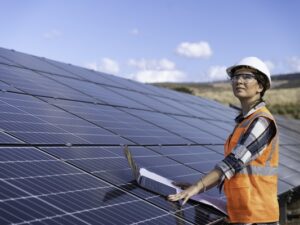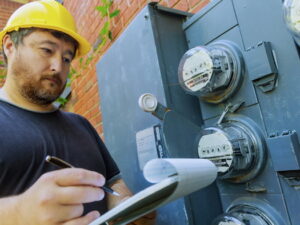
“Why is my electric bill so high?”
If you’re asking these types of questions, you’re not alone. Many households are feeling the pinch of rising electricity rates, especially during the hottest and coldest months of the year. But beyond inflation or regional utility price hikes, there’s a bigger factor at play: the planet is overheating. And that might be contributing more to your energy costs than you realize.
You may have noticed that recent summers seem hotter than they used to be. That’s not just your imagination. Average global temperatures have been steadily rising over the past few decades, a phenomenon largely driven by human activities like burning fossil fuels.
As the planet heats up, we experience more extreme weather, including heat waves. And when the mercury soars, it becomes harder—and more expensive—to keep our homes comfortable.
Climate Change and High Energy Bills
There are a ton of reasons why your energy bills might be so high, but here are three climate-related areas that may help you track down the culprit.
Your AC is Running Overtime
One of the most direct ways that climate change affects your energy bill is through increased demand for air conditioning. When the temperature outside is very high, your A/C has to work harder to push heat out of your home and maintain a cool indoor environment. The longer and harder your air conditioner runs, the higher your energy bill climbs.
During heat waves, your air conditioning system works overtime to keep your home cool. That uses a lot of electricity, which increases demand on the power grid. This drives up prices, which are then passed along to consumers.
To be specific, a large home with central air conditioning running eight hours per day spends an average of $72-$108 per month on AC alone. During extremely hot months and heat waves, that amount rises even higher.
Your Appliances and Their Excessive Energy Usage
It’s not just your air conditioning that’s working harder. Many of the appliances in your home — your refrigerator, freezer, and even your water heater — are affected by extreme temperatures. When it’s hot outside, your refrigerator and freezer have to run more frequently to maintain their set temperatures, which increases energy consumption.
Worse, older appliances use more energy than newer, energy-efficient models. If you haven’t upgraded your dishwasher in the past 15 years, it might be crying out for help by working harder and jacking up your energy bills.
Your Home’s Construction Could Be Working Against You
Energy inefficiency fuels high energy bills, as it causes your heating, cooling, and electrical systems to work way harder than they need to. Older or poorly insulated homes lose cold air quickly, meaning your HVAC system consumes more energy making up the difference.
For example, in walls and attics, insulation acts as a barrier to heat transfer, helping to keep warm air inside during winter and outside during summer. Poorly insulated walls or attic spaces allow air to move freely, causing cool air to escape and summer heat to sneak in. Attics, in particular, are common sources of air loss. Even small leaks in areas like attic hatches, exhaust fans, or chimneys allow conditioned air to escape.
Some other examples: Older single-pane windows are less effective at blocking heat transfer. Traditional bulbs use more energy and produce more heat compared to LED bulbs. Outlets and light switches are often sources of hidden drafts and air leakage.
Are you catching our drift? An energy inefficient home is a hotter home — especially during a major heatwave. 🥵️
Why Are We Seeing More Extreme Weather?
The overheating of our planet is largely due to the buildup of greenhouse gases in the atmosphere. These gases, like carbon dioxide and methane, trap heat and cause global temperatures to rise. As a result, we’re experiencing more frequent and intense heat waves, droughts, and storms.
According to scientists, climate change is responsible for making extreme weather events more severe. heat waves, in particular, are becoming longer and more intense, which means more days spent blasting the A/C.
When you combine rising outdoor temperatures with inefficient home cooling systems and increased appliance use, it’s easy to see why energy bills are soaring.
What You Can Do About Carbon Pollution
While there are things you can do to reduce your personal energy use, addressing the root cause of rising temperatures—climate change—requires broader action. The fact is, unless we slow the rate of global warming, extreme weather and rising energy costs are likely to continue.
If you’re concerned about your rising energy bills and the impact of climate change, there are ways you can take action:
-
-
- Get an energy home audit: A professional energy audit can help identify specific inefficiencies and provide customized recommendations. The Inflation Reduction Act (IRA) provides a tax incentive up to $150 for home energy audits.
- Upgrade to energy-efficient appliances: Look for ENERGY STAR-rated products, which are designed to use less energy without sacrificing performance. This includes upgrading your air conditioner (or even swapping it for a heat pump), refrigerator, and light bulbs. You can even snag some home improvement credits for making energy efficient upgrades.
- Support good climate policies: Advocate for climate solutions by contacting your elected representatives and encouraging them to support policies that reduce carbon emissions.
- Volunteer: Citizens’ Climate Lobby is a nonpartisan group looking to protect what we have for future generations to enjoy. CCL volunteers work in their communities and with government leaders to advocate for climate solutions, and you don’t need any prior experience to get involved. Join CCL today.
-
Lowering Your Energy Bills Once and For All
The overheating planet is contributing to higher energy bills, but there are steps you can take to manage your costs and help address the root cause. From upgrading your appliances to improving your home’s insulation, making small changes can add up. But tackling the broader issue of climate change requires collective action.
If you’re ready to do something about it, join Citizens’ Climate Lobby. Together, we can push for effective climate policies that reduce greenhouse gas emissions and help protect our planet—and our energy bills—for future generations.






